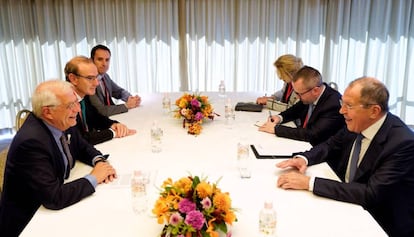Russia denies interference in Catalonia or in Spain’s domestic affairs
A week after it emerged that the Spanish High Court is probing the activities of an elite military group, the Foreign Ministry is talking about an anti-Russia campaign by the media


The Russian Foreign Ministry on Thursday denied any type of interference in Catalonia or in Spain’s domestic affairs.
The statement comes a week after EL PAÍS revealed that Spain’s High Court, the Audiencia Nacional, is investigating the alleged activities of a group linked with the Russian intelligence services during the 2017 Catalan breakaway bid.
The Russian foreign ministry spokeswoman, Maria Zakharova, said that some media organizations seem obsessed with bringing back “a half-forgotten issue,” and she talked about “an anti-Russia campaign.”
#Zakharova: Once again some Spanish #media brought the spotlight on #Russia’s alleged interference in #Spain’s domestic affairs regarding #Catalonia developments. On Nov. 21, Acting Spanish FM @JosepBorrellF effectively fended off these allegations as “pure libel”. pic.twitter.com/T6x018RXmv
— MFA Russia 🇷🇺 (@mfa_russia) November 28, 2019
“We are observing an unhealthy interest by certain Spanish media and blogs in the return, or reincarnation, of the half-forgotten issue of Russian interference in Spain’s domestic matters in connection with events in Catalonia,” said Zakharova at her weekly news conference.
The foreign ministry’s statement is the first official reaction by Moscow to the Spanish court investigation into an elite military group called Unit 29155, which intelligence services from several Western countries have linked to serious operations such as the assassination attempt on former Russian spy Sergei Skripal, or a coup attempt in Montenegro.
Zakharova also criticized a news story published by this newspaper regarding Spain’s decision not to create a joint working group with Russia to fight cybersecurity threats and information manipulation. The agreement to create the group was reached a year ago by Russia’s foreign minister Sergey Lavrov and his Spanish counterpart, Josep Borrel. The latter has also criticized the news story.
A spokespeson for the Diplomatic Information Office has admitted that the working group was never created and there are no plans for doing so, but that this does not mean that Spain and Russia are not cooperating in the fight against fake news.
“We have repeatedly said that the hysterical anti-Russia campaign in the foreign media, who accuse Moscow of all kinds of interference, will end up affecting its authors,” said Zakharova.
English version by Susana Urra.
Tu suscripción se está usando en otro dispositivo
¿Quieres añadir otro usuario a tu suscripción?
Si continúas leyendo en este dispositivo, no se podrá leer en el otro.
FlechaTu suscripción se está usando en otro dispositivo y solo puedes acceder a EL PAÍS desde un dispositivo a la vez.
Si quieres compartir tu cuenta, cambia tu suscripción a la modalidad Premium, así podrás añadir otro usuario. Cada uno accederá con su propia cuenta de email, lo que os permitirá personalizar vuestra experiencia en EL PAÍS.
¿Tienes una suscripción de empresa? Accede aquí para contratar más cuentas.
En el caso de no saber quién está usando tu cuenta, te recomendamos cambiar tu contraseña aquí.
Si decides continuar compartiendo tu cuenta, este mensaje se mostrará en tu dispositivo y en el de la otra persona que está usando tu cuenta de forma indefinida, afectando a tu experiencia de lectura. Puedes consultar aquí los términos y condiciones de la suscripción digital.








































